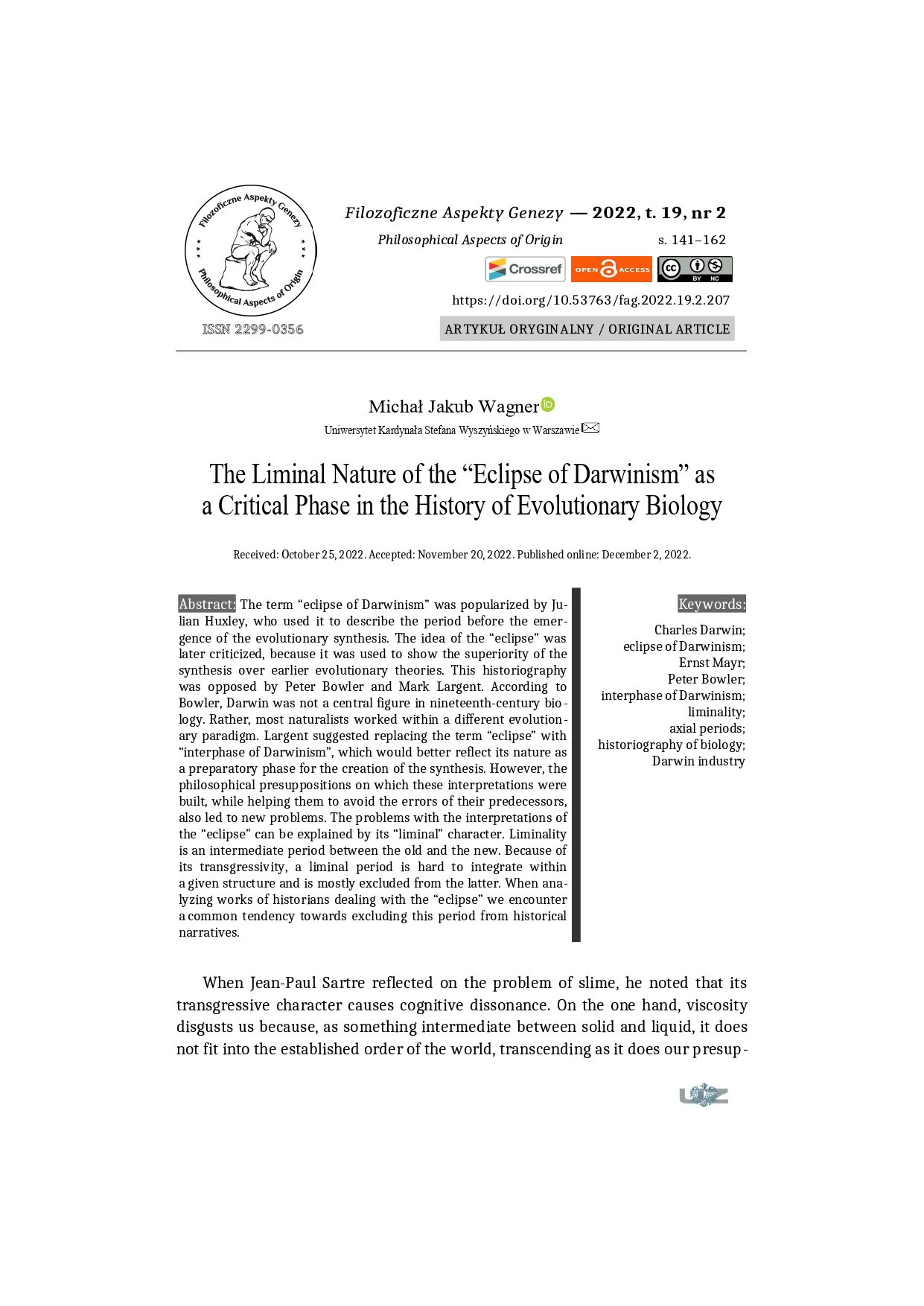The Liminal Nature of the "Eclipse of Darwinism" as a Critical Phase in the History of Evolutionary Biology

Opublikowane 02.12.2022 — zaktualizowane 22.12.2022
Wersje
- 22.12.2022 - (3)
- 21.12.2022 - (2)
- 02.12.2022 - (1)
Słowa kluczowe
- Charles Darwin,
- eclipse of Darwinism,
- Ernst Mayr,
- Peter Bowler,
- interphase of Darwinism
- liminality,
- axial periods,
- historiography of biology,
- Darwin industry ...More
Prawa autorskie (c) 2022 Filozoficzne Aspekty Genezy

Utwór dostępny jest na licencji Creative Commons Uznanie autorstwa – Użycie niekomercyjne 4.0 Międzynarodowe.
Jak cytować
Abstrakt
The term “eclipse of Darwinism” was popularized by Julian Huxley, who used it to describe the period before the emergence of the evolutionary synthesis. The idea of the “eclipse” was later criticized, because it was used to show the superiority of the synthesis over earlier evolutionary theories. This historiography was opposed by Peter Bowler and Mark Largent. According to Bowler, Darwin was not a central figure in nineteenth-century biology. Rather, most naturalists worked within a different evolutionary paradigm. Largent suggested replacing the term “eclipse” with “interphase of Darwinism”, which would better reflect its nature as a preparatory phase for the creation of the synthesis. However, the philosophical presuppositions on which these interpretations were built, while helping them to avoid the errors of their predecessors, also led to new problems. The problems with the interpretations of the “eclipse” can be explained by its “liminal” character. Liminality is an intermediate period between the old and the new. Because of its transgressivity, a liminal period is hard to integrate within a given structure and is mostly excluded from the latter. When analyzing works of historians dealing with the “eclipse” we encounter a common tendency towards excluding this period from historical narratives.
Downloads
Bibliografia
- Bentley Michael, Past and «Presence»: Revisiting Historical Ontology, History and Theory 2006, Vol. 45, No. 3, s. 349–361, https://doi.org/10.1111/j.1468-2303.2006.00370.x.
- Bowler Peter J., Do We Need a Non-Darwinian Industry?, Notes and Records of the Royal Society of London 2009, Vol. 63, No. 4, pp. 393–398, https://doi.org/10.1098/rsnr.2009.0008.
- Bowler Peter J., Charles Darwin: The Man and His Influence, Basil Blackwell, Oxford 1990.
- Bowler Peter J., Darwin Deleted: Imagining a World Without Darwin, The University of Chicago Press, Chicago — London 2013.
- Bowler Peter J., Evolution: The History of an Idea, University of California Press, Berkeley — Los Angeles — London 1989.
- Bowler Peter J., Life’s Splendid Drama: Evolutionary Biology and the Reconstruction of Life’s Ancestry 1860–1940, The University of Chicago Press, Chicago — London 1996.
- Bowler Peter J., Revisiting the Eclipse of Darwinism, Journal of the History of Biology 2005, Vol. 38, No. 1, pp. 19–32, https://doi.org/10.1007/s10739-004-6507-0.
- Bowler Peter J., The Eclipse of Darwinism: Anti-Darwinian Evolution Theories in the Decades Around 1900, The John Hopkins University Press, Baltimore — London 1992.
- Bowler Peter J., The Non-Darwinian Revolution: Reinterpreting a Historical Myth, The Johns Hopkins University Press, Baltimore — London 1988.
- Cain Joe, Rethinking the Synthesis Period in Evolutionary Studies, Journal of the History of Biology 2009, Vol. 42, No. 4, pp. 621–648, https://doi.org/10.1007/s10739-009-9206-z.
- Cain Joe and Ruse Michael (eds.), Descended from Darwin: Insights into the History of Evolutionary Studies, 1900-1970, American Philosophical Society, Philadelphia 2009.
- Chang Hasok, Is Water H2O? Evidence, Realism and Pluralism, Springer, Cambridge 2012.
- Churchill Frederick B., In Search of the New Biology: An Epilogue, Journal of the History of Biology 1981, Vol. 14, No. 1, pp. 177–191, https://doi.org/10.1007/BF00127520.
- Delisle Richard G., From Charles Darwin to the Evolutionary Synthesis: Weak and Diffused Connections Only, in: Delisle (ed.), The Darwinian Tradition…, pp. 133–167.
- Delisle Richard G. (ed.), The Darwinian Tradition in Context, Springer, Cham 2017.
- Douglas Mary, Purity and Danger: An Analysis of Concepts of Pollution and Taboo, Routledge, London — New York 1984.
- Hull David L., Science as a Process: An Evolutionary Account of the Social and Conceptual Development of Science, The University Chicago Press, Chicago — London 1988.
- Huxley Julian, Evolution: The Modern Synthesis, George Allen and Unwin, London 1945.
- Jaspers Karl, The Origin and Goal of History, Yale University Press, New Haven — London 1957.
- Kuhn Thomas S., Logic of Discovery or Psychology of Research, in: Kuhn, The Essential Tension…, pp. 266-292.
- Kuhn Thomas S., The Essential Tension: Selected Studies in Scientific Tradition and Change, The University of Chicago Press, Chicago 1977.
- Kuhn Thomas S., The Structure of Scientific Revolutions, The University of Chicago Press, Chicago 1996.
- Largent Mark A., Darwinism in the United States, 1859–1930, in: Ruse (ed.), The Cambridge Encyclopedia of Darwin…, pp. 226–234.
- Largent Mark A., The So-Called Eclipse of Darwinism, in: Cain and Ruse (eds.), Descended from Darwin…, pp. 3–21.
- Mayr Ernst, The Advance of Science and Scientific Revolutions, Journal of the History of the Behavioral Sciences 1994, Vol. 30, No. 4, pp. 328–334, https://doi.org/10.1002/1520-6696(199410)30:4<328::AID-JHBS2300300402>3.0.CO;2-0.
- Mayr Ernst, One Long Argument: Charles Darwin and the Genesis of Modern Evolutionary Thought, Harvard University Press, Cambridge 1991.
- Mayr Ernst, The Growth of Biological Thought: Diversity, Evolution, and Inheritance, The Belknap Press of Harvard University Press, Cambridge — London 1982.
- Mayr Ernst, What Makes Biology Unique? Considerations on the Autonomy of a Scientific Discipline, Cambridge University Press, Cambridge 2004.
- Mayr Ernst, The Myth of the Non-Darwinian Revolution, Biology and Philosophy 1990, Vol. 5, No. 1, pp. 85–92, https://doi.org/10.1007/BF02423835.
- Rana Shalini and Pandya Digvijay, Liminality: A Close Study of Historical Roots and Theoretical Structure, Language in India 2021, Vol. 21, No. 10, pp. 21–43, https://tiny.pl/wfm2q [28.11.2022].
- Ruse Michael (ed.), The Cambridge Encyclopedia of Darwin and Evolutionary Thought, Cambridge University Press, Cambridge 2009.
- Sartre Jean-Paul, Being and Nothingness: An Essay on Phenomenological Ontology, Routledge, London 1969.
- Shedinger Robert F., The Mystery of Evolutionary Mechanisms: Darwinian Biology’s Grand Narrative of Triumph and the Subversion of Religion, Cascade Books, Eugene 2019.
- Smocovitis Vassiliki B., Unifying Biology: The Evolutionary Synthesis and Evolutionary Biology, Princeton University Press, New Jersey 1996.
- Thomassen Bjørn, The Uses and Meanings of Liminality, International Political Anthropology 2009, Vol. 2, No. 1, pp. 5–28.
- Turner Victor, Liminal to Liminoid, in Play, Flow, and Ritual: En Essay in Comparative Symbology, Rice Institute Pamphlet – Rice University Studies 1974, Vol. 60, No. 3, pp. 53–92, https://doi.org/10.5433/2176-6665.2012v17n2p214.
- Turner Victor, The Ritual Process: Structure and Anti-Structure, Cornell University Press, New York 1991.
- Wagner Michał Jakub, Interpretacje rozwoju biologii ewolucyjnej na przełomie XIX i XX wieku, Liber Libri, Warszawa 2020.
- Young Christian C. and Largent Mark A., Evolution and Creation: A Documentary and Reference Guide, Greenwood Press, Westport — London 2007.


